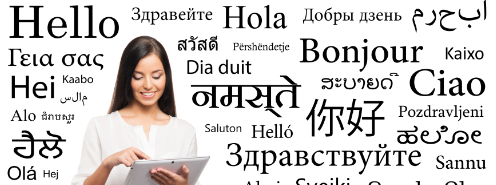Translators contribute to democratic debate
Translators play a surprisingly active role, when civil society debates the future of Europe and EU with citizens and migrants,ten years of fieldwork show.
 Would english as a common language for all EU-citizens nurture democratic debate? This is sometimes discussed. Following the recent conclusions of Associate Professor Nicole Doerr, The Department of Sociology, the answer would be no.
Would english as a common language for all EU-citizens nurture democratic debate? This is sometimes discussed. Following the recent conclusions of Associate Professor Nicole Doerr, The Department of Sociology, the answer would be no.
Nicole Doerr has done ten years of fieldwork comparing meetings of transnational civil society organizations like European Social Forum with national meetings taking place in Germany, Italy and United Kingdom. They set up meetings for citizens and
migrants to debate the future of Europe and the EU .
And Doerr was surprised with her observations:
-Contrary to my expectations, the multilingual international assemblies worked better and had more democratic elements than the national ones, where speaking one national language is common, says Nicole Doerr.
Doerr also noted what made the difference:
-The translators are not just linguistic translators– they take actively part by paving the way for those not heard, she says.
Translators facilitate debate
Doer describes a 'political translation' in her new book.
- I observed a self-organized practice developed by participants in order to address inequities hindering democratic debate and to entreat powerful participants to work more inclusively with less empowered members and groups, she says.
- The potential presence of political translators is of greater importance to democratic debate than everybody in a forum speaking the same language, my research shows, she says.
Not necessarily more expensive
While the British government is planning to cut spending for interpreting and translation, Germany is massively investing in cooperation with local civic associations in providing linguistic interpretation and translation in the field of migration management and asylum policy, says Doerr. Which might be a good idea, she says:
- Civic practices of self-organized political translation may turn real differences among debating groups into a resource for deepening democracy in multilingual, multicultural societies and cities, and as they often work on a volunteer base, they do not necessarily increase spending.
Topics
New book: Political Translation
Associate Professor Nicole Doerr, The Department of Sociology, has written 'Political Translation: How Social Movement Democracies Survive' - a comparative study of study of deliberation under conditions of linguistic difference and cultural misunderstandings.
Based on empirical studíes the author presents the collective practices of political translation, which help multilingual and culturally diverse groups work together more democratically than homogeneous groups. Political translation, distinct from linguistic translation, is a set of disruptive and communicative practices developed by activists and grassroots community organizers in order to address inequities hindering democratic deliberation and to entreat powerful groups to work together more inclusively with disempowered groups.
